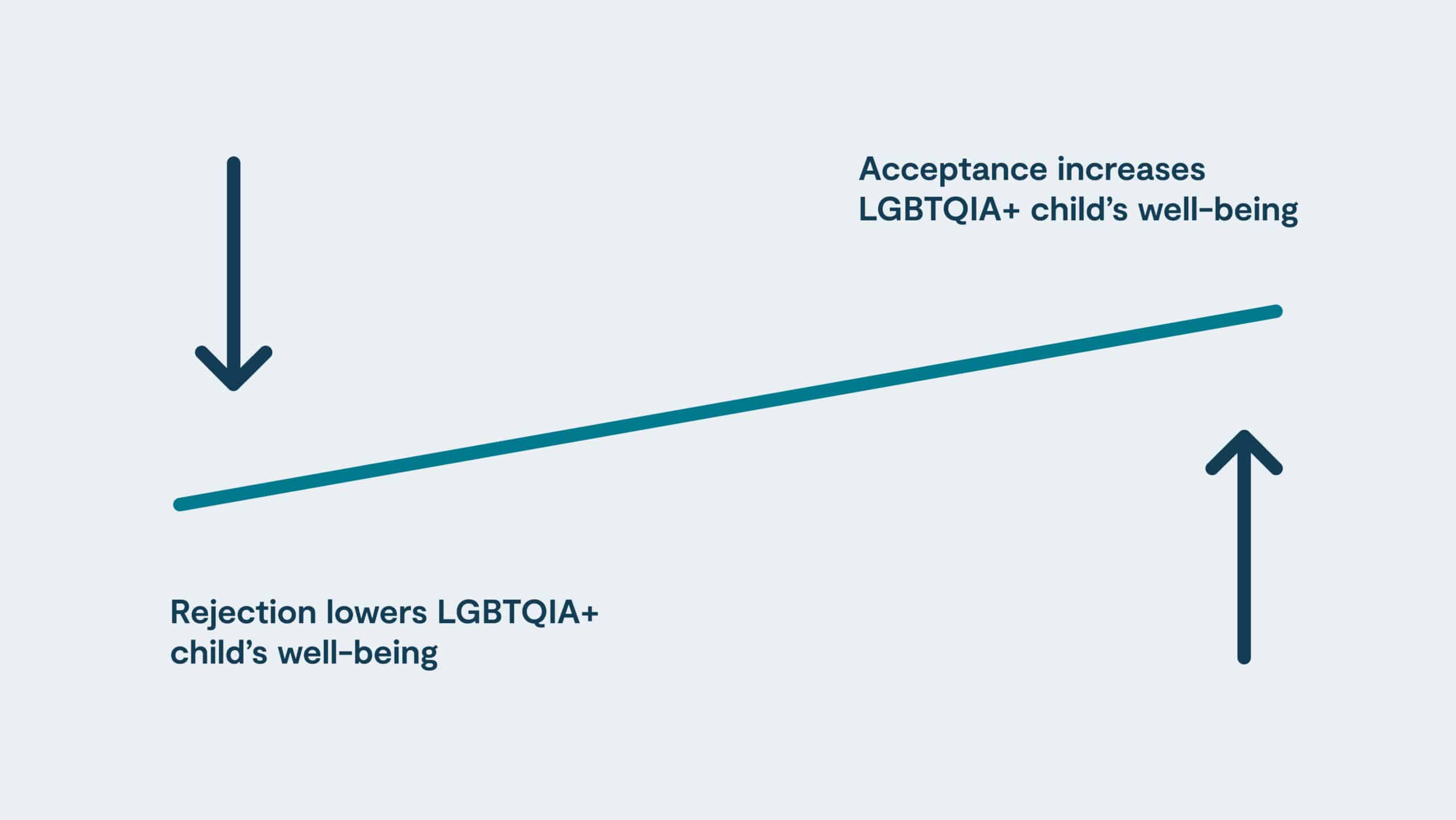How to Support Your LGBTQIA+ Child
June 3, 2024
Parents and caregivers love their children. We want to do everything we can to support our kids’ safety, health, and happiness. While we can’t always control the challenges that LGBTQIA+ children face, we can help them in ways that positively impact their well-being and the well-being of our families.
Letting LGBTQIA+ kids know that we love them can shield them from LGBTQIA+ stressors. Pause to experience your love for your child and tell them you love them. You can say, “I love you, and I’m here for you,” or, “I’m proud of you, and I’ll always love you.”
Reminding your kids that you love them is important because when LGBTQIA+ kids get support from their families, they grow up healthier and happier.
Unfortunately, typical parenting advice doesn’t provide guidance on supporting LGBTQIA+ kids. It may come as a surprise that what counts as “supportive” for LGBTQIA+ kids may not be obvious, and some efforts to protect LGBTQIA+ kids can actually hurt their well-being.
Fortunately, we can turn to research-backed approaches to help our LGBTQIA+ kids thrive and strengthen families.
Understanding your LGBTQIA+ child’s experiences
Children have unique experiences discovering their LGBTQIA+ identities. Most kids begin expressing their gender identity around age three and realize their sexual orientation around age 12, although it can happen earlier. Some LGBTQIA+ kids may hide their identities from others, including loved ones, for fear of rejection. Rejection decreases well-being and health outcomes while acceptance improves LGBTQIA+ kids’ well-being.

The reason it’s important to be aware of these rejecting or accepting behaviors is that LGBTQIA+ kids are at greater risk of experiencing violence and mental distress. LGBTQIA+ kids who get the message that a core part of their identity is shameful are less likely to value themselves. They’re more likely to face mental health challenges and engage in risky behaviors. The 2023 U.S. National Survey on the Mental Health of LGBTQ Young People revealed that:
- 43–71% faced discrimination
- 54% reported symptoms of depression
- 41% seriously considered suicide
Compared to LGBTQIA+ young adults whose families accepted them in their teen years, those who faced family rejection were:
- 5.9 times more likely to experience depression
- 3.4 times more likely to use illegal drugs
- 8.4 times more likely to attempt suicide
The parent and caregiver experience
Most parents and caregivers don’t intend to reject their LGBTQIA+ children, and their reactions often stem from worries about their children’s safety and well-being. Others might feel upset that their dreams for their child won’t turn out as hoped. Meanwhile, some families may feel conflicted about their religious beliefs or values.
Processing such complex emotions is important—when we’re not with our kids. While you’re processing these feelings, it’s important to not exhibit rejecting behaviors that don’t support your child, such as:
- Pressuring them to change their identity, appearance, or behavior
- Blocking them from LGBTQIA+ friends and resources
- Blaming them when they experience LGBTQIA+ discrimination
- Telling them that their LGBTQIA+ identity is sinful
- Making them keep their identity secret
- Avoiding conversations about their identity or LGBTQIA+ issues
Instead, demonstrate understanding and acceptance with these four tips.
1) Encourage your child’s overall wellness
LGBTQIA+ kids can best feel celebrated and encouraged when they’re loved, respected, and supported. Compared to LGBTQIA+ kids who face family rejection, those with accepting families are:
- Less likely to experience depression, suicidal thoughts, and substance use
- More satisfied with their lives overall
- More likely to have close family relationships
- More likely to believe they’ll have a good life in the future
- More likely to want a family of their own someday if they so choose
Putting the well-being of your child first can help them flourish and feel accepted in their environment and surroundings.
2) Talk openly with your LGBTQIA+ child
Hold space for ongoing conversations with your child about their identity. Take the time to educate yourself on LGBTQIA+ terms, and ask what name or pronouns they’d like you to use. Try to steer away from asking for explanations, making assumptions, and giving advice. Instead, respect their gender expression and be supportive.
When talking to your LGBTQIA+ child, here are some suggested tips that may be helpful:
- Know that each child is different.
- Ask questions to show curiosity and support.
- Reassure your child that you want to listen and learn.
- It’s OK to pause and come back to the conversation.
- Empathize and remind your child that you love them.
3) Connect your LGBTQIA+ child to support
It’s important to ensure that all family members respect the identity of your child and continue to include them in family events. Get to know their friends and teachers, and explore local LGBTQIA+ organizations and programs that your child may be interested in.
Sharing resources like the GSA Network, It Gets Better, and The Trevor Project can also be helpful. If your faith community rejects LGBTQIA+ people, consider finding more accepting communities.
Pay attention to major changes in your child’s mood and behavior. Share your concerns with your child, and offer to connect them with a mental health expert who shares their identity and experiences. And remember to care for yourself and connect with parents of other LGBTQIA+ kids or with a therapist who can offer additional support.
4) Believe your LGBTQIA+ child has a bright future
Hold faith in your LGBTQIA+ child’s potential for a happy, healthy, and fulfilling future. Communicate your optimism to your child. Remember that avoiding rejection and embracing acceptance can make a tremendous, positive difference in your child’s future.
Lyra Health offers advanced provider preferences, meaning you and your loved ones can get matched with a mental health coach or therapist who understands your lived experience, background, and identity.
Author
The Lyra Team
The Lyra Team is made up of clinicians, writers, and experts who are passionate about mental health and workplace well-being. With backgrounds in clinical psychology, journalism, content strategy, and product marketing, we create research-backed content to help individuals and organizations improve workforce mental health.
Explore additional blogs

Mental health tips
How Radical Acceptance Can Decrease Your Stress

Mental health tips
Empty Nest Syndrome: Missing Them, Finding You

Mental health tips